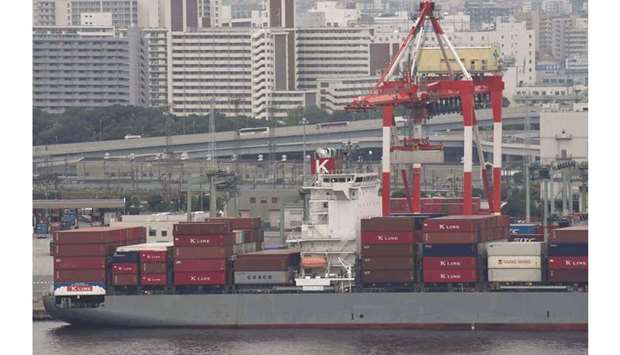Japan’s government downgraded its assessment of the economy yesterday but maintained the view it was recovering, suggesting that escalating US-China trade tensions have yet to hit growth enough to put off this year’s scheduled sales tax hike.
The fallout from the trade war and slowing global demand have clouded the outlook for the export-reliant economy, keeping alive market expectations that Prime Minister Shinzo Abe may postpone a twice-delayed increase in the sales tax in October.
But Economy Minister Toshimitsu Motegi shrugged off such speculation, saying Japan should proceed with the tax hike. Japan needs revenues to pay for bulging welfare costs to support a fast-ageing population and curb the industrial world’s heaviest public debt burden, which is twice the size of its $5tn economy.
“There’s no change to our plan to raise the sales tax as scheduled,” he told reporters after the report was issued.
“I don’t think things are that bad. Manufacturing is affected by the US-China trade dispute. But if you look at the supply side of our economy, manufacturing accounts for only 21%,” he said, adding that the service sector that makes up a bulk of the economy is doing well, with consumption “holding up”.
A senior ruling party lawmaker close to Abe was more cautious.
The tax hike should go ahead if the economy remains in the present state, but the government must scrutinise developments in US-China trade talks and their impact on Japan’s economy, Katsunobu Kato, head of the general council at Abe’s ruling Liberal Democratic Party (LDP), told Reuters.
“The biggest factor to look out for is the US-China trade friction,” Kato said. “Global economic developments change all the time, so we need to watch out for them.” If the tax increase deals too much of a blow to the economy, the government can take steps to prop up growth and the central bank could be called upon to help revive the economy, Kato added.
In its economic report for May, the government described the world’s third-largest economy as “recovering at a moderate pace, while weakness in exports and industrial production continues.” That was a slightly bleaker view than last month, when it said the economy was recovering moderately despite “some” weakness in exports and output.
Some analysts had previously expected the report could drop the view the economy was recovering, to signal that growth was too weak to weather the hit from the higher levy. Abe has repeatedly said he would proceed with an increase in the sales tax rate to 10% from 8% in October unless the economy was hit by a severe shock. But some lawmakers have called for a postponement on concerns it could tip Japan into recession.
The previous hike to 8% from 5% hit consumers hard and triggered a deep downturn.
A government index measuring current economic conditions showed Japan may already be in recession, while first-quarter gross domestic product (GDP) data showed weakness in consumption and capital expenditure.
In the monthly report, the government also cut its view on output and capital expenditure, nodding to the growing pain from US-Sino trade tensions and slowing Chinese demand. But it stuck to the view that domestic demand remains strong enough to moderate some of the pain from overseas headwinds, helping keep Japan’s recovery intact.
“Export growth is moderating due to China’s slowdown, which is keeping output weak,” a government official told a briefing, adding that some manufacturers were putting off capital spending plans.
“But consumption and capital expenditure continue to grow as a trend. The fundamentals supporting domestic demand remain firm,” he said.

A freighter is anchored at the international container pier at Tokyo port. Japan’s government downgraded its assessment of the economy yesterday but maintained the view it was recovering, suggesting that escalating US-China trade tensions have yet to hit growth enough to put off this year’s scheduled sales tax hike.
